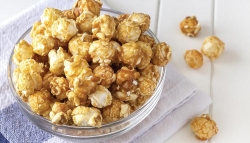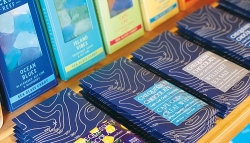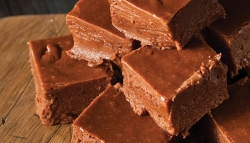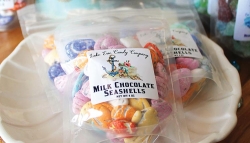Treats for the beach |
| By Kristin Ely |
|
|
The timing is ripe for coastal retailers considering adding food to their offerings. Souvenir stores up and down the Eastern Seaboard, West Coast, Gulf Coast and Great Lakes are known to lure customers young and old with the sweet aromas of fudge, saltwater taffy, ice cream and other edible delights. Gift stores and boutiques in those same locales also sell their fair share of food goods from unique condiments, coffees and teas, specialty sauces, jams and chocolates. Depending on the food’s locally made or homegrown status, it can be more than something to tantalize the tastebuds, it can make a great gift or solidify someone’s memories of a vacation spot and even the specific store where the purchase was made. But if you’ve never dabbled in deliciousness it might seem like a risky gamble. Unlike other goods, food has a limited shelf life, but the benefits of carrying food goods often outweighs the risks. A low price point and broad appeal could make food an instant hot seller.
 Related Article: "Popping Up Memories" The family-owned company is situated in the southeastern part of the North Carolina Coastal Plain region and has been in agribusiness for more than 100 years. In addition to owning 80 acres of muscadine grape vineyards, the company has longtime relationships with growers in the area who have allowed it to produce more than 200 small batch and locally sourced handmade products, ranging from jellies, 100% juices, ciders to pickles and sauces. Its proximity to the coast has helped D’Vine partner with coastal retailers on food offerings. Ward shares advice for other seaside stores looking to get a piece of that pie.What are some benefits to carrying food inside a shop?The number one reason is simple. Everybody eats. The number two reason is because you can offer customers a taste of something that is from your particular area or state. Not only does everyone eat, everything tastes better on the beach. That gives a retailer a wonderful opportunity to own that memory. You can offer shoppers something that they associate with coastal times.In the Carolinas someone even trademarked the phrase, “Take a peach to the beach.”  Related Article: "A Popular Gift" What types of food should a seaside retailer carry?One reason we recommend products that are handmade and small batch is that they are most likely shelf stable so as a retailer you are not having to be so concerned with expiration dates. You can offer these items year-round. If you go with a private label, it is a reinforcement of a brand that owners have spent years developing. It is made for them, reinforcing their brand and returning the repeat customer back to their store for the second buy, or referring others for their first buy instead of going to a website and bypassing the retailer.How can a retailer get started with carrying food products?I suggest starting with one to five products and then naturally grow it organically from there. If you are not currently offering food, I would take one of two approaches.I would try a few best sellers from different categories. One of those categories could be sweet things like jams, jellies, fruit juices and fruit butters. Then I would cross over into sauces, pickles and relish and maybe do a nice, limited smorgasbord. That way if a person who comes into your store doesn't like sweets, you didn’t miss the sale because you had nothing else to offer them.  Related Article: "Hand in Hand" You could start with three products, with each being either very similar to or very different from one another. Some people may want to begin with savory and others may want to begin with sweet. Our customers’ success and our wholesaling success has been built on offering a good balance between things that are a bit unusual — that you could not walk into the grocery store and find on the shelf — combined with things that are really tried and true. Your customer wants to know that things are locally sourced and handmade. True-small batch is becoming more important to people. When people know that your products are special in those kinds of ways, when you show them something unusual like apple pie moonshine jelly, it’s unique and then they trust you and understand the quality. Why does food appeal to the coastal customer?People who go to the beach like to take fresh foods with them. Many farms are in close proximity to coastal areas, and these beachgoers also pass by lots of farms on their car trip to coastal areas. Fruits and vegetables are on their minds.While on vacation, these travelers often take the time to purchase fresh produce and cook for themselves. They can use jellies, jams, sauces and other flavorful store-bought ingredients to improve or enhance the recipes that they prepare with these fresh fruits and vegetables.
 Related Article: "Going All in on Candy" More and more people are appreciating where their food comes from and how it is made. It’s a way a seaside retailer allows people to take home a part of their coastal area. How can a seaside retailer determine what brands of food to carry?When they choose products, I do highly recommend private label because to me the part of the individual retailer that is important, and every day becomes more important, is the individual story of that retailer: why they are in business, how they are in business and where they are in business.There’s always that story and when people shop brick and mortar retail especially, they really love these stories and know what sets you apart. The product line you pick should be a reflection of that story. We service many coastal businesses, some even side by side that just need different products or a different interpretation or promotion of the same product and they all do very well. |
